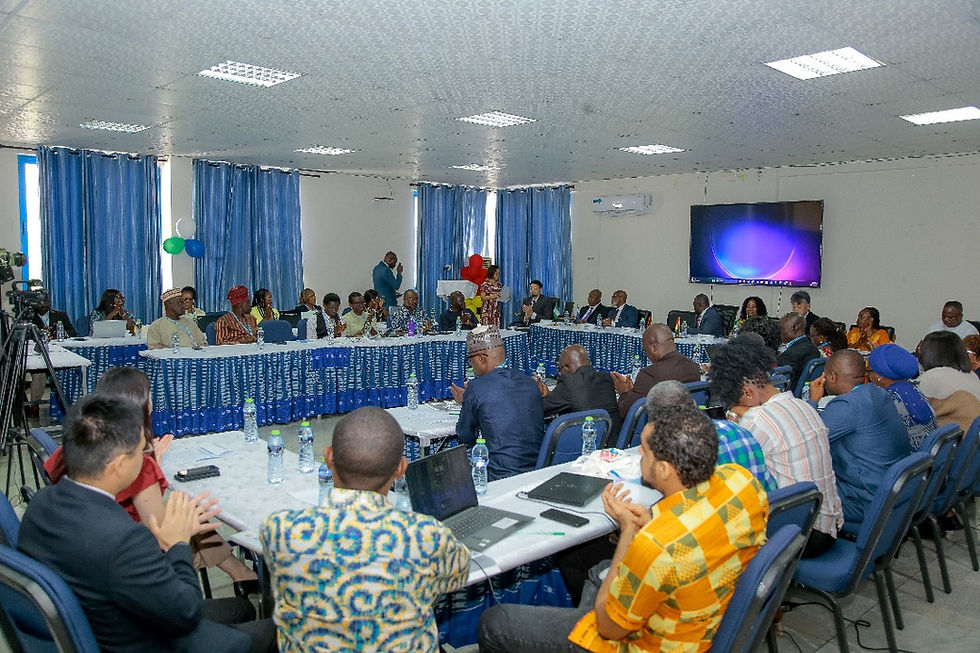"Lithium will not be exported in its raw state" - Lands Minister
- Think News Online
- Dec 7, 2023
- 4 min read

The Government of Ghana has emphasized that lithium will not be exported in its raw state.
The Minister of Lands and Natural Resources, Samuel A. Jinapor made these known while addressing Journalists in Accra on Thursday.
He said "However, the volumes of the mineral we have, currently, and our quest to ensure optimal benefit from the exploitation of this mineral made that option not feasible for several reasons. Firstly, globally, only China,
has an end-to-end lithium value chain, from mining to battery production"
"This is why, we have instituted in this transaction the retention of a significant part of the vale chain which we work systematically to eventually construct the full value chain in country. But as we have said, we will not export lithium in its raw state"
"That is why the Mining Lease includes provisions for the
establishment of a refinery and the provision of the by-products to local industries"
"Suffice for me to point out that, it is the first time in the history of our country that, we have successfully negotiated for ten percent (10%) royalties for any mineral, which is one of the highest for exploitation of any mineral across the globe. We have already secured a nineteen percent (19%) State participation in this mining company, with the requirement to scale it up to a minimum of thirty percent (30%) Ghanaian participation through listing on the Ghana Stock Exchange for shares to be made available to Ghanaians and Ghanaian entities"
"And for the first time in the history of our country, a mining lease contains provisions for the establishment of a refinery. The issue of ratification of the mining lease, which has been raised by several people, has never been lost on us. This is expressly provided for in the Mining Lease granted to Barari DV Ltd"
"Specifically, Clause 1(e) of the Lease states as follows:
This Mining Lease is subject to ratification by Parliament in accordance with Article 268(1) of the Constitution and section 5(4) of Act 703. Upon execution of this Mining Lease, the Minister shall cause the Mining Lease to be laid in Parliament for ratification"
"By the very terms of the Lease, therefore, ratification by Parliament is a condition precedent. As the Supreme Court explained in Republic v High Court, (General Jurisdiction 6), Accra; ex parte Attorney-General (Exton Cubic – Interested Party) (Unreported, Civil Motion No. J5/40/2018, dated 31st July, 2019), an unratified mining lease confers no enforceable rights, and Government has always been mindful of this decision"
"But before such agreements can be laid before Parliament, it must go through a number of processes, including securing Cabinet’s approval. The processes are ongoing, and once completed, the Agreement would be laid before Parliament for consideration and ratification"
"There have, also, been calls to grant mining leases through a tender process. As we explained in our earlier press release, international best practice requires that where a company undertakes exploration and makes commercial find for minerals, the company is entitled to a right of first refusal to the grant of a mining lease, subject to regulatory compliance"
"This international best practice is given legal backing by section 39(2) of the Minerals and Mining Act, 2006 (Act 703). Needless to point out that, the use of the tender process is only feasible where there already exists geological data and the State is looking for partners to go straight into mining. Regulation 258(1)
of the Minerals and Mining (Licensing) Regulations, 2012 (L.I. 2176), which deals with the grant of mineral rights by tender gives three instances under which such process may be used"
"They are; where the Minerals Commission determines that there exists sufficient mineral information in respect of the area concerned; where the Republic has carried out prior mineral exploration in respect of the area concerned"
"Where an area becomes available through surrender,
revocation or termination and two or more applications are recorded in the Priority Register within the seven days of the area becoming vacant.”
"In all these circumstances, the State would have enough geological data generated through its own exploration, or where a holder of a mineral right surrenders his interest, or the right is otherwise
revoked or terminated. But where this data is generated by a private company that has carried out exploration, at great cost, then that entity is by virtue of section 39(2) of Act 703 entitled to the grant of a mineral right subject to regulatory compliance, in which case the tender system cannot be legally turnable"
He stresse that the historical lack of resources to undertake exploration has, thus, meant that Ghana have had to depend on private companies to undertake exploration for most of its minerals, which then entitles
them to the grant of mining leases without going through any tender process.
He revealed that there have, also, been calls for the establishment of a Ghana Lithium Company to undertake lithium mining and develop the value chain of the mineral from lithium mining to battery
production.
"It will be recalled that the Policy Statement presented
to Parliament last year, considered the option of establishing such an entity, along the concept of the Ghana Integrated Aluminium Development Corporation (GIADEC) and the Ghana Integrated Iron
and Steel Development Corporation (GIISDEC)"
Mr. Jinapor further noted that the Government of President Akufo Addo remains committed to the prudent, effective and efficient management of the natural resources of the country.
"We remain focused on this goal, and call on you all,
nationals and residents of our country, to support Government in this quest"
Story: Joshua Kwabena Smith








Comments